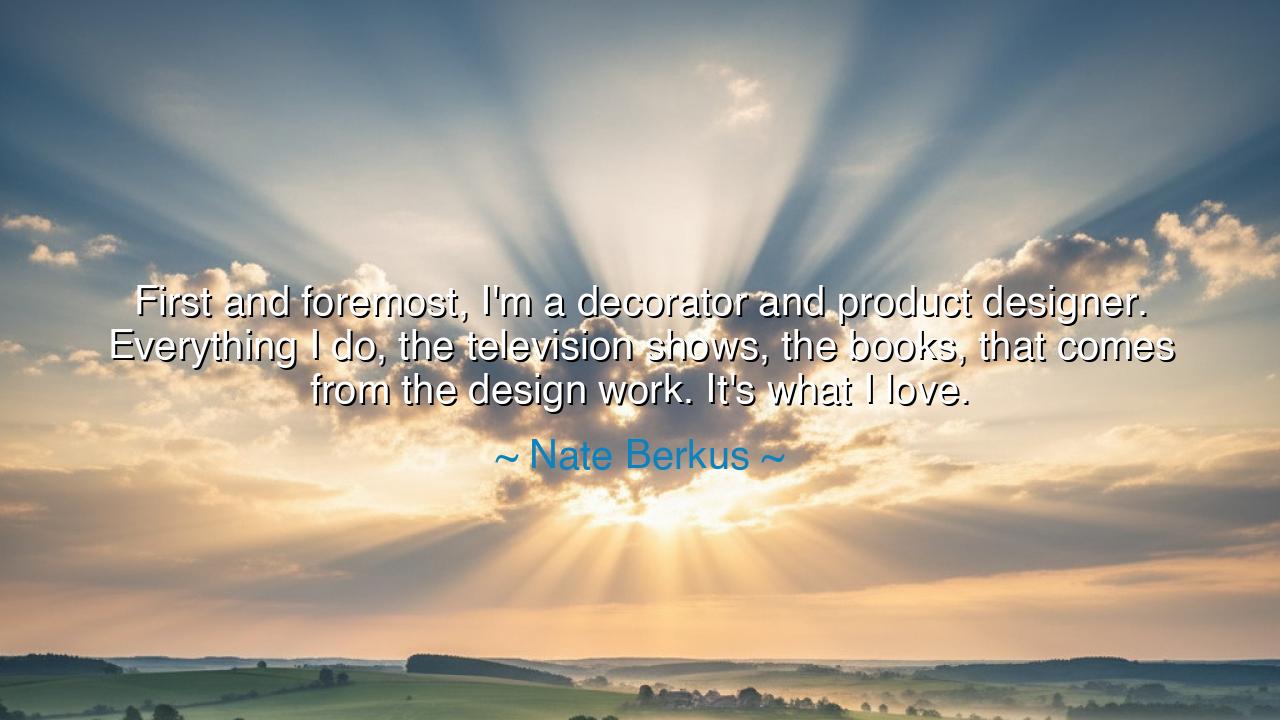
First and foremost, I'm a decorator and product designer.
First and foremost, I'm a decorator and product designer. Everything I do, the television shows, the books, that comes from the design work. It's what I love.






"First and foremost, I'm a decorator and product designer. Everything I do, the television shows, the books, that comes from the design work. It's what I love." – Nate Berkus
In these words, Nate Berkus, the modern oracle of aesthetic harmony, reveals a profound truth about the essence of vocation: that all external accomplishments — accolades, publications, and appearances — are but branches of a single root, nourished by the love of one’s craft. To declare, “I’m a decorator and product designer first and foremost,” is to acknowledge the heart of creation itself: that true mastery begins not in performance, but in devotion. Everything else flows from this devotion — a television show, a book, a celebrated collection — all are the flowering of the labor done quietly, faithfully, at the core of one’s being.
The origin of this quote lies in Berkus’s career, which spans interior design, product creation, and media. Unlike many who chase fame, Berkus identifies first with the act of creation itself, not the accolades it brings. His design work is his compass, guiding all endeavors, and his fame is a reflection of his love for the craft rather than the pursuit of recognition. This mirrors the ancient principle that passion and purpose must precede reputation, that mastery is a byproduct of devotion rather than its currency.
Throughout history, the greatest creators have understood this truth. Leonardo da Vinci, famed for his paintings, inventions, and studies of anatomy, never sought fame for its own sake. His notebooks, brimming with sketches, calculations, and observations, were born of fascination and curiosity, not applause. Similarly, Berkus’s television shows and books exist because the design work compelled him to communicate, to share the language of beauty and function with the world. In both cases, love of the craft precedes all other rewards.
This declaration also speaks to the unity of human endeavor. Berkus’s work spans mediums — interiors, products, television, literature — yet all flow from the same source: design. The ancients would recognize in this a reflection of holistic creation, where art, philosophy, and craft are not separate, but aspects of a single pursuit. Just as a sculptor’s understanding of anatomy informs his statue, or a poet’s understanding of music informs verse, Berkus’s design practice informs every other endeavor. Mastery is not compartmentalized; it is a way of perceiving and shaping the world.
Consider the story of Michelangelo, who painted the Sistine Chapel, sculpted David, and designed architectural marvels in Florence and Rome. To him, there was no hierarchy of work; each act of creation, whether with brush, chisel, or plan, was an expression of the same devotion to form and beauty. Berkus echoes this ancient truth: his television shows and books are not departures from design, but extensions of it — the same passion rendered in new language. Creativity, once kindled, cannot be confined to a single medium; it flows outward, shaping every expression it touches.
There is also humility and honesty in Berkus’s words. To declare what one loves first, before fame, before recognition, is to place truth above vanity. It reminds us that the path to excellence begins not in ambition, but in genuine engagement with the work itself. For those who love their craft, success follows naturally; for those who pursue success alone, love often becomes secondary, and the soul is impoverished. Berkus’s clarity of purpose is a beacon: to do what you love first, and let the world respond in its own time.
Lesson: My children, learn this: anchor yourself in what you truly love. Let your craft, your passion, your devotion, be the foundation upon which all else is built. Fame, recognition, and reward are but branches that grow from roots of love and discipline. Engage fully with what calls to you — be it design, writing, teaching, or any other art — and allow every other endeavor to flow from it. Like Nate Berkus, let the work itself guide you, and let all external successes be the natural echo of your devotion.
In the end, Berkus’s wisdom calls us to embrace our calling with courage and clarity. To love the work is to honor oneself and the world; to let every action flow from that love is to live a life of coherence, integrity, and lasting impact. Creation, rooted in passion, becomes not only a vocation but a manifestation of the soul, touching others in ways that fame alone never could.






AAdministratorAdministrator
Welcome, honored guests. Please leave a comment, we will respond soon